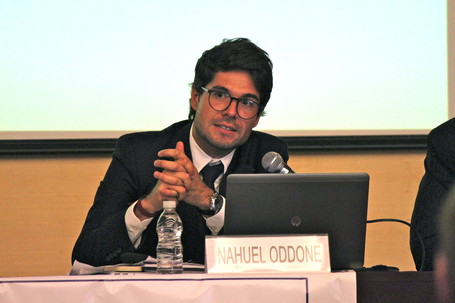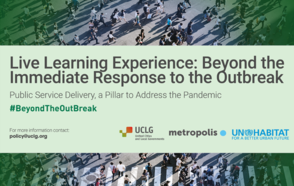
By Nahuel Oddone, Nahuel Alvaredo.
Cities are a key line of action against COVID-19. They face the challenge of mitigating its spread in urban areas that, due to their own configuration, are the main focus of infection. Containment is not the only challenge, since they cannot lose sight of the economic effects of preventive measures or the need to guarantee an orderly functioning of services.
The mayors of Barcelona, Amsterdam, Milan and Paris published a joint letter in El País where they stated that “the cities have a long experience in cooperation between us, which we have intensified with this health crisis and we know from experience that in the face of crises, union, solidarity and cooperation are fundamental”. In this regard, several platforms were created by city networks in order to enable access to information and exchange of practices.
United Cities and Local Governments (UCGL) along with UN-Habitat have launched “Live Learning Experience #BeyondTheOutbreak” to share experiences through live sessions. This exercise involved the participation of local and regional public officers who intervene in areas affected by the pandemic such as social development, housing, public services, transportation, local businesses, prevention of gender and intra-family violence and others. As a part of this initiative Metropolis and AL-LAS developed “Cities for Global Health” that brings together actions from urban areas to respond to COVID-19.
 In South America, Mercociudades made available the tool called “Mercociudades responde al COVID-19”, whose function is to guide cities to make easier the task of finding available information from official sources and solutions adopted by other local governments. Along the Uruguay River, the Committee for the Development of the Uruguay River Basin -which is composed of cities from Argentina, Brazil and Uruguay- began to monitor the evolution of the outbreak on this area based on official data in order to progress with joint work.
In South America, Mercociudades made available the tool called “Mercociudades responde al COVID-19”, whose function is to guide cities to make easier the task of finding available information from official sources and solutions adopted by other local governments. Along the Uruguay River, the Committee for the Development of the Uruguay River Basin -which is composed of cities from Argentina, Brazil and Uruguay- began to monitor the evolution of the outbreak on this area based on official data in order to progress with joint work.
There are local initiatives that include prevention, containment and mitigation. Regarding scientific cooperation, Barcelona SciTech DiploHub stands out. It is a public-private articulation that represents the scientific ecosystem of the city, which leads the cooperation against COVID-19 and seeks to provide evidence to the international public debate. In Curitiba, through the FabLab of the government, facial protection masks for health professionals are produced using 3D printers.
In respect to living and social assistance, the articulation of transitional hostel networks has been one of the key measures to help people the homeless. The Municipality of Lima has launched “Albergue Casa de Todos” for the days of social distancing and isolation. The creation of solidarity networks has been a widespread strategy, for example, Buenos Aires designed “Mayores cuidados”, a volunteer program to provide logistical support for elderly people or adults with risk factors. Through geolocation they prioritize the proximity of the volunteer and the beneficiary.
The economic challenge in the face of preventive measures affects the people who are not registered as employees or are self-employed. The Municipality of Bogota will provide a guaranteed minimum income to households in poverty, with monetary and in-kind supports. Alternative marketing also gains value, the Association of Street Vendors and the Municipality of Montevideo created a portal to sell their food products with home delivery.
C40 launched the Global Mayors COVID-19 Recovery Task Force, a task force chaired by the Mayor of Milan, to reflect on the post-coronavirus reality: a future based on economic stability, poverty reduction, health system improvements, and tools for future outbreaks. Urban-rural differences, the scale of the city and the particularities of metropolitan areas, the main sources of generation and distribution of local wealth that impact tax collection and the respect for municipal autonomy and coordination between different levels of government will surely be reviewed after the pandemic. Thinking through the day after the pandemic from the local level tests the creativity and effectiveness of those who make decisions and make public policies.
- The Spanish here.











